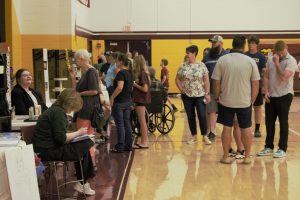News
Federal Hocking board abruptly makes senior projects optional after a community survey shows broad dissatisfaction
By: Theo Peck-Suzuki | Report for America
Posted on:
ATHENS, Ohio (WOUB/Report for America) — The ongoing dispute over the Federal Hocking 100-hour senior project graduation requirement took an unexpected turn after the board voted to make the projects optional with immediate effect.
Superintendent Jason Spencer had previously suggested the district would make a final decision on the projects in the spring, and that this decision would not affect this year’s juniors.
However, that was before he and the board received the results of a survey that showed an overwhelming majority of Fed Hock community members — including teachers — supported changing the projects. In response, Spencer recommended the board make the project optional immediately, which it did at its Oct. 15 meeting.
That means this year’s juniors, who had already begun planning their projects, will be the first Fed Hock class since the 1990s not to have the requirement. Fed Hock teacher Nick Warmke, who helped oversee the projects, wrote in an email that he was “shocked.”
“I was under the very distinct impression that we would continue to have ongoing discussions with the community. I really liked the input and thoughtfulness of the first meeting and was looking forward to more of them,” he wrote, referring to an Oct. 2 community listening session. “I was even more surprised that the new changes would take effect immediately. I see a tremendous amount of value to these projects, and as one of the staff members in charge of administering the curriculum related to them, I’m very much at a loss.”
Spencer shared some of the survey results in an email to the community. According to his email, 57.2% of teachers selected “no opinion,” “disagree” or “strongly disagree” when asked if the project was a valuable graduation requirement. That’s lower than families (67.3%) and other community members (71.1%).
In another question, Spencer wrote, teachers and community members were asked if the project should “remain as is.” Only 19.4% of teachers said yes, compared to 22.3% for families and 8.9% for community members.

Sheridan-Boyd said the results confirmed some of the concerns she’s had about the projects for a while.
“You have those parents that are pushing their children to do this great project, and not everybody has that support at home, or the financial … not everybody has the financial support to do these elaborate projects,” she said.
And then there’s the matter of Fed Hock’s state report card, which came in this year at just two stars, the lowest in Athens County.
“So it’s like, OK. Why are we adding graduation requirements when we’re not necessarily doing the best we can with the core things?” Sheridan-Boyd said. “So let’s refocus, regroup and work on those core things, get our students that stuff, then re-add things back in.”
Spencer said the state report card was also a top concern of his moving forward.
“To be honest, when I got here, I was told that we don’t look at the report card. That was a direct quote, ‘We do not look at the report card.’ Well … we have the lowest performance out of all the districts around us, and by not looking at it, that doesn’t help us improve,” Spencer said.
Spencer said his approach going forward is to focus on professional development for teachers and staff.
“What is it that we’re missing? Is it that we don’t understand what’s required? And that might be it,” Spencer said. “If we don’t know what’s expected of us, if kids don’t know what’s expected of them, how are they ever going to meet the bar? … We have to make sure that we’re aligning our curriculum and our instructional practices to those expectations.”
Spencer also said the district will continue looking into creating a scholarship for students who still want to do a senior project but need financial support. That idea was raised at the Oct. 2 listening session and generated strong interest among the parents in attendance.
As for what students who still choose to do their project will get for their effort, Spencer said that’s still to be decided, but it probably won’t be class credit.
“What I recommended to the board was an acknowledgement at graduation, sort of like you see with National Honors Society, where they get a cord,” he said, adding that he’s still waiting to get feedback on that suggestion.
Warmke wrote that he’s still figuring out what the school year will look like now that the projects are optional, but said there will likely be “significant modification.”
“I wish I had a concrete answer to give you about what things look like going forward, but I’ll have to talk to quite a few people before I can do that,” he wrote. “We’ll have to be really thoughtful about how to approach this, and it’s going to take a lot of time and energy to figure out how to do it right.”

